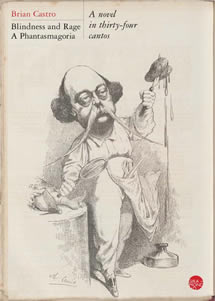Reviewed by Rama Gaind.
By Brian Castro, Giramondo Publishing, $26.95.
 There’s nothing like an experiment to test the waters, and in this case it’s a novel. Castro believes in being innovative and he outlines why in Blindness and Rage.
There’s nothing like an experiment to test the waters, and in this case it’s a novel. Castro believes in being innovative and he outlines why in Blindness and Rage.
The short lines bring out the pulsing potentials of Castro’s prose, boost his liveliness and love of witticisms, his use of insinuation and allegory.
The protagonist Lucien Gracq, suffering from a terminal illness, moves to Paris from Adelaide to complete the epic poem he is writing and to live out his last days. There he joins a secret writers’ society, Le club des fugitifs, that guarantees to publish the work of its members anonymously, thus relieving them of the burdens of life, and more importantly, the disappointments of authorship.
‘Gracq finds himself crossing paths with a parade of phantasms, illustrious writers from the previous century – masters of identity, connoisseurs of eroticism, theorists of game and rule, émigrés and Oulipeans.’
The recipient of the 2014 Patrick White Literary Award, Castro says Blindness and Rage is a novel of 34 cantos. Why? “Because each of the three cantiche in Dante’s The Divine Comedy consists of 33 cantos. To go one more was to call attention to the elasticity of prose. I was interested in Dante’s masterpiece since Blindness and Rage is a journey to hell and back, a preoccupation with a dubious eschatology. Why did I write it in canto form? Because I wanted the prose to have a distinctive feel of not being solely prosaic, harkening back to older forms of the mock-epic, such as Pope’s Dunciad or more recently, Burgess’ Byrne.”
It is also likened to Alexander Pushkin’s Evgeni Onegin with its mixture of wonder and melancholy.
![]()


